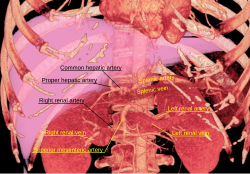Renovascular hypertension

Editor-In-Chief: Prab R Tumpati, MD
Obesity, Sleep & Internal medicine
Founder, WikiMD Wellnesspedia &
W8MD's medical weight loss NYC, sleep center NYC
Philadelphia medical weight loss and Philadelphia sleep clinics
| Renovascular hypertension | |
|---|---|

| |
| Synonyms | Renal artery stenosis |
| Pronounce | N/A |
| Specialty | Nephrology, Cardiology |
| Symptoms | High blood pressure, headache, blurred vision, nosebleeds |
| Complications | Chronic kidney disease, heart failure, stroke |
| Onset | Typically in adults |
| Duration | Long-term |
| Types | N/A |
| Causes | Atherosclerosis, fibromuscular dysplasia |
| Risks | Smoking, diabetes, high cholesterol, family history |
| Diagnosis | Blood tests, urinalysis, renal artery ultrasound, CT angiography, MR angiography |
| Differential diagnosis | Essential hypertension, pheochromocytoma, Cushing's syndrome |
| Prevention | N/A |
| Treatment | Antihypertensive drugs, angioplasty, stenting, surgery |
| Medication | ACE inhibitors, ARBs, calcium channel blockers, beta blockers |
| Prognosis | Variable, depends on underlying cause and treatment |
| Frequency | Common in older adults |
| Deaths | N/A |


Renovascular hypertension is a condition characterized by high blood pressure due to narrowing of the arteries that carry blood to the kidneys, a condition known as renal artery stenosis. This condition is a type of secondary hypertension, which means it is caused by an underlying health condition, unlike primary hypertension, which has no identifiable cause.
Causes[edit]
Renovascular hypertension is most commonly caused by atherosclerosis, a condition where fatty deposits build up in the arteries. Another cause is fibromuscular dysplasia, a condition that causes the walls of the arteries to grow abnormally. Both conditions can lead to narrowing of the renal arteries, reducing blood flow to the kidneys and triggering the release of hormones that raise blood pressure.
Symptoms[edit]
Symptoms of renovascular hypertension can vary and may be similar to those of other forms of hypertension. They can include headaches, shortness of breath, and visual disturbances. In some cases, renovascular hypertension can lead to renal failure, a serious condition where the kidneys stop working properly.
Diagnosis[edit]
Diagnosis of renovascular hypertension typically involves a combination of physical examination, medical history, and diagnostic tests. These tests can include blood tests, urine tests, ultrasound, computed tomography (CT) scan, magnetic resonance angiography (MRA), and renal arteriography.
Treatment[edit]
Treatment for renovascular hypertension aims to control blood pressure and treat the underlying cause of the condition. This can involve lifestyle changes, medication, and in some cases, surgery or angioplasty to widen the narrowed renal arteries.
See also[edit]
Ad. Transform your life with W8MD's Budget GLP-1 injections from $49.99


W8MD offers a medical weight loss program to lose weight in Philadelphia. Our physician-supervised medical weight loss provides:
- Weight loss injections in NYC (generic and brand names):
- Zepbound / Mounjaro, Wegovy / Ozempic, Saxenda
- Most insurances accepted or discounted self-pay rates. We will obtain insurance prior authorizations if needed.
- Generic GLP1 weight loss injections from $49.99 for the starting dose of Semaglutide and $65.00 for Tirzepatide.
- Also offer prescription weight loss medications including Phentermine, Qsymia, Diethylpropion, Contrave etc.
NYC weight loss doctor appointmentsNYC weight loss doctor appointments
Start your NYC weight loss journey today at our NYC medical weight loss and Philadelphia medical weight loss clinics.
- Call 718-946-5500 to lose weight in NYC or for medical weight loss in Philadelphia 215-676-2334.
- Tags:NYC medical weight loss, Philadelphia lose weight Zepbound NYC, Budget GLP1 weight loss injections, Wegovy Philadelphia, Wegovy NYC, Philadelphia medical weight loss, Brookly weight loss and Wegovy NYC
|
WikiMD's Wellness Encyclopedia |
| Let Food Be Thy Medicine Medicine Thy Food - Hippocrates |
Medical Disclaimer: WikiMD is not a substitute for professional medical advice. The information on WikiMD is provided as an information resource only, may be incorrect, outdated or misleading, and is not to be used or relied on for any diagnostic or treatment purposes. Please consult your health care provider before making any healthcare decisions or for guidance about a specific medical condition. WikiMD expressly disclaims responsibility, and shall have no liability, for any damages, loss, injury, or liability whatsoever suffered as a result of your reliance on the information contained in this site. By visiting this site you agree to the foregoing terms and conditions, which may from time to time be changed or supplemented by WikiMD. If you do not agree to the foregoing terms and conditions, you should not enter or use this site. See full disclaimer.
Credits:Most images are courtesy of Wikimedia commons, and templates, categories Wikipedia, licensed under CC BY SA or similar.
Translate this page: - East Asian
中文,
日本,
한국어,
South Asian
हिन्दी,
தமிழ்,
తెలుగు,
Urdu,
ಕನ್ನಡ,
Southeast Asian
Indonesian,
Vietnamese,
Thai,
မြန်မာဘာသာ,
বাংলা
European
español,
Deutsch,
français,
Greek,
português do Brasil,
polski,
română,
русский,
Nederlands,
norsk,
svenska,
suomi,
Italian
Middle Eastern & African
عربى,
Turkish,
Persian,
Hebrew,
Afrikaans,
isiZulu,
Kiswahili,
Other
Bulgarian,
Hungarian,
Czech,
Swedish,
മലയാളം,
मराठी,
ਪੰਜਾਬੀ,
ગુજરાતી,
Portuguese,
Ukrainian
